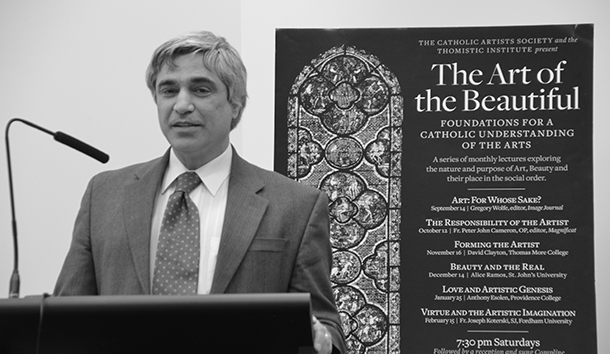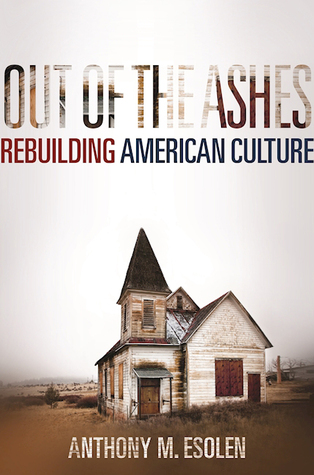If we don’t like the way of life around us, why not live differently? Why go along with something so inhuman and unrewarding? So asks Anthony Esolen in his new book.
Good criticism calls for a conception of what should be as well as an analysis of what is. Esolen provides both. Like any social critic he explains what’s wrong with our current way of life, and does it very well. His special contribution, though, is his description of basic aspects of life whose normal functioning could once be taken for granted: education, civic life, popular amusements, everyday craftsmanship, the world of boyhood, the dance of the sexes—what they have been, how they have lost their way, and why it is possible and necessary for them to return to type.
He writes passionately, eloquently, and concretely, drawing illustrations from a variety of sources: on the one hand, the current scene; on the other, family recollections, 19th-century pictures, scenes from Homer and Shakespeare, old civic buildings from small-town Pennsylvania and Nova Scotia. He has the sense of the connection between grand principle and everyday particularities to be looked for in a translator of Dante, so his illustrations hit home.
True to the title, he also provides suggestions for resistance and counterattack. They are mostly simple and obvious: Clear your mind of cant. Multiply schools that educate. Toss out literary and artistic junk and bring back the good, beautiful, and true. Stop insisting that the sexes are the same. Deny moral authority to those who have none, and comply only minimally with authority that overreaches. And above all, remember what is basic and permanent—in particular, the Christian revelation.
This book must be read. To some extent the descriptive passages repeat and illustrate what has been said before, by the author and others, but rarely if ever so simply, directly, and vividly. For what the book does I cannot praise it too highly.
Even so, the descriptions of current disorder and the possibilities of return to something better are so persuasive that there is a lurking sense here that something is missing. If what Esolen says is the obvious good sense it seems to be, why haven’t his proposals already been carried out? A very few people have done so here and there, in bits and pieces, but why nothing more broad-based and comprehensive?
After all, no one forced us into our present situation. We may have arrived where we are through drift and inadvertence, or by listening too much to false promises, but what keeps us here now that we’ve seen what it’s like? We still, for the most part, have free speech, free elections, free enterprise, freedom of religion, and freedom to choose a way of life. The Amish and Hasidim live in a way very much at odds with the majority. Why don’t Christians generally do the same?
Instead, we mostly go in the same direction everyone else is going, but perhaps with more grumbling and foot-dragging. Why is our resistance so halfhearted, and why does it invariably lose traction and fall apart? Why is it so hard to stay collected and focused?
To answer that question we need to look at the nature of social life and the kind of society we live in. An appeal to higher authority is needed to resist illegitimate authority effectively, and the author includes a rousing defense of Christian identity. It’s hard, though, for an isolated person to maintain a dissenting vision, so resistance also requires denser and more committed local community. The author responds to that need with an emphasis on the revival of civic life, and presents a few small Christian colleges as signs of hope for the future.
The response seems correct but insufficient. More needs to be said, especially about the industrial organization of life. That form of society is effective at realizing specific concrete goals, like winning wars or producing floods of consumer goods, so it’s very hard to get rid of. But it’s also effective at dissolving human connections and competing centers of authority, thus disrupting community and reducing people socially to consumers, clients, employees, and not much more.
Man is social and thinks and acts in community, so the effect is radically to undercut thought and agency. That makes our regime all but immune to popular uprisings. Confucius noted a basic limitation on tyranny: “You may rob the Three Armies of their commander-in-chief, but you cannot deprive the humblest peasant of his opinion.” His opponents’ successors, our modern social technologists, have plugged the hole. They’ve learned how to construct opinion, implant it in the popular mind, and disrupt contrary trains of thought so they never get anywhere.
Under such circumstances, how can ordinary local communities become sufficiently durable and coherent to support a way of life independent of bureaucracy and commercial pop culture? Rod Dreher’s famous “Benedict Option” invokes monasticism as a model, while Esolen’s examples suggest academic life as it has been recreated in a few places. Such select and highly intentional communities can indeed succeed, at least for a time, basing their solidity on ideal commitments supported by the rituals, doctrines, and disciplines of a particular religion.
It’s doubtful, though, that the same is true of the everyday local communities within which most people carry on their lives. As a practical matter, such communities require not only religion but elements of family, kinship, inherited culture, and ethnic identity to support durable loyalties and a distinct sense of who the members of the group are and what can be expected of them. That is especially true today, when technology has annihilated space.
So Western Christians are not likely to get far in their struggle to survive as Christians if they retain the commitment to cosmopolitan universalism that has become, even in their own eyes, a requirement for moral legitimacy. Respectable Christians today would rather have an antiparticularistic Christianity that is available only to a few committed and disciplined heroes of the faith than one that accepts the normal means of local social bonding. That attitude lies behind seemingly odd objections to The Benedict Option as being indifferent or hostile to minority concerns. Similar objections will be raised against Esolen’s book if it attracts enough attention.
In the end, though, such complaints are beside the point. Absolute cosmopolitanism destroys itself because it provides no basis for people to carry on life together. Efficiency is not enough. For that reason the American future is likely to look more like the Middle East, which is radically particularistic because it is so radically cosmopolitan, than like anything contemporary Westerners would approve. It seems, then, that for Christians and other well-disposed people the task today is to accept the aspects of particularism needed for a coherent and civilized way of life—for example, the acceptance of borders and the rejection of inclusiveness as an overriding standard—while thinking deeply about how to do so without falling into a narrow tribalism.

[Out of the Ashes: Rebuilding American Culture, by Anthony M. Esolen (Washington, D.C.: Regnery Publishing) 256 pp., $27.99]

Leave a Reply